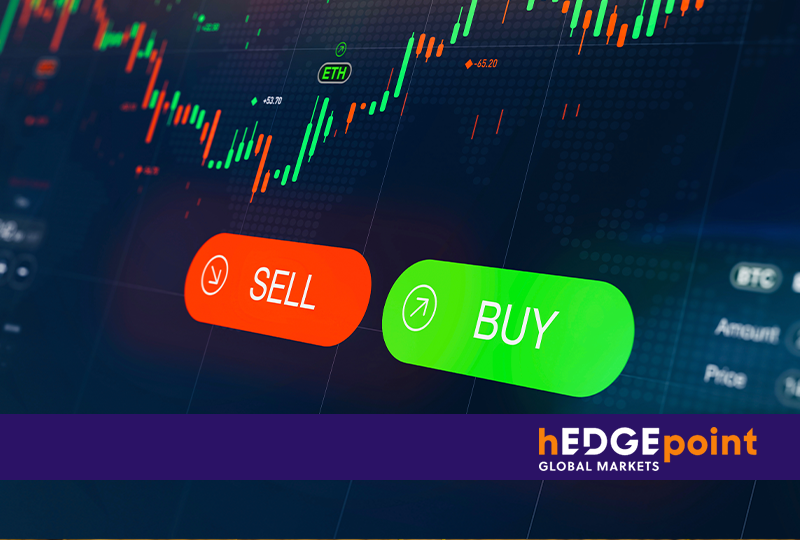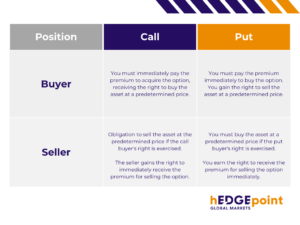
What are the differences between call and put? This is a question asked by even the most experienced traders. These two terms are part of the options marke

What are the differences between call and put? This is a question asked by even the most experienced traders.
These two terms are part of the options market and both are financial instruments in the group of derivatives traded on the stock exchange and the over-the-counter market. They give you the right to buy or sell a certain physical or financial asset.
Therefore, an option gives the holder (buyer) the right to exercise it, not the obligation. The option writer (seller), on the other hand, must carry out the exercise if the holder wishes to do so. This is the major distinction between the futures and forward markets, in which the holder is obliged to buy or sell the underlying asset.
Want to understand how call and put options work in practice? Then check them out:
Read on to find out!
Call options are a type of derivative traded all over the world. It is a security that gives the buyer the right to buy a certain asset at a predetermined price (strike) on a future date (expiry).
Two operations can be carried out with this tool: buying and selling calls. We explain each one below.
Let’s start by thinking from the point of view of the buyer of commodities, such as the soybean oil industry that needs to buy soybeans. Call options provide effective protection against possible price rises in international soybean prices.
When you buy a call, you guarantee the right to buy soybeans at a predetermined price, called the strike. If the price of soybeans is higher than the strike when the option expires, the holder can exercise it and guarantee to buy at the strike of their option. In other words, at a lower level than the current price.
In this way, buying a call makes it possible to protect yourself and make a profit when the price of the underlying asset rises. Another advantage of buying calls is that there is no need for margin deposits. You only pay the premium at the start of the trade, which is the price at which you bought the option.
Buying a call option allows the holder to make a positive financial adjustment as the underlying asset’s price rises. This is because it is based on the idea that exercise will occur at the price previously stipulated.
To make a profit on the expiry of the option in a scenario in which the asset rises in value, all the holders must do is exercise the option. They will be buying the underlying asset at a cheaper price, as established in the option contract. You can then sell the asset at a higher market price.
If the asset falls in value by the time the option expires, it makes no sense to exercise it at the price defined in the option but rather to buy the asset at the (lower) market price. In this situation, the option is not exercised, and the holder loses the amount he paid for his premium.
Traders who sell calls have the prospect that, at expiry, the asset will depreciate enough for the price to be below the strike price.
As a result, the option loses value since it makes no sense for the buyer to exercise it. In this case, the seller will make the maximum profit from the operation, which is given by the premium. If the asset rises in value at expiry, the seller of the call will have to sell the asset at the strike price.
It is common for traders and speculators to sell call options when assets are in a downtrend. In this way, they seek to make a profit at expiry on the premium paid when selling the calls.
Put options are sales options. In other words, it’s a security that gives the buyer the right to sell an asset at a predetermined price on a future date. As with call options, you can buy or sell puts. Below, we explain each one.

Understanding the differences between call and put is essential for managing risks in the commodities market. This makes it possible to protect prices from volatility, which contributes to decision-making.
hEDGEpoint operates with knowledge of all commodity hedging instruments. We combine technology, insights, and data analysis to apply risk management tools.
On our exclusive platform, you’ll find courses from basic to advance to understand these instruments in detail.
Visit the hEDGEpoint HUB to find out more!

Rua Funchal, 418, 18º andar - Vila Olímpia São Paulo, SP, Brasil
Contato
(00) 99999-8888 example@mail.com
Section
Home
O que Fazemos
Mercado
Quem Somos
HUB
Blog
Esta página foi preparada pela Hedgepoint Schweiz AG e suas afiliadas (“Hedgepoint”) exclusivamente para fins informativos e instrutivos, sem o objetivo de estabelecer obrigações ou compromissos com terceiros, nem de promover uma oferta ou solicitação de oferta de venda ou compra de quaisquer valores mobiliários, commodity interests ou produtos de investimento.
A Hedgepoint e suas associadas renunciam expressamente a qualquer uso das informações contidas neste documento que direta ou indiretamente resulte em danos ou prejuízos de qualquer natureza. As informações são obtidas de fontes que acreditamos serem confiáveis, mas não garantimos a atualidade ou precisão dessas informações.
O trading de commodity interests, como futuros, opções e swaps, envolve um risco substancial de perda e pode não ser adequado para todos os investidores. Você deve considerar cuidadosamente se esse tipo de negociação é adequado para você, levando em conta sua situação financeira. O desempenho passado não é necessariamente indicativo de resultados futuros. Os clientes devem confiar em seu próprio julgamento independente e/ou consultores antes de realizar qualquer transação.
A Hedgepoint não fornece consultoria jurídica, tributária ou contábil, sendo de sua responsabilidade buscar essas orientações separadamente.
A Hedgepoint Schweiz AG está organizada, constituída e existente sob as leis da Suíça, é afiliada à ARIF, a Associação Romande des Intermédiaires Financiers, que é uma Organização de Autorregulação autorizada pela FINMA. A Hedgepoint Commodities LLC está organizada, constituída e existente sob as leis dos Estados Unidos, sendo autorizada e regulada pela Commodity Futures Trading Commission (CFTC) e é membro da National Futures Association (NFA), atuando como Introducing Broker e Commodity Trading Advisor. A Hedgepoint Global Markets Limited é regulada pela Dubai Financial Services Authority. O conteúdo é direcionado a Clientes Profissionais e não a Clientes de Varejo. A Hedgepoint Global Markets PTE. Ltd está organizada, constituída e existente sob as leis de Singapura, isenta de obter uma licença de serviços financeiros conforme o Segundo Anexo do Securities and Futures (Licensing and Conduct of Business) Act, pela Monetary Authority of Singapore (MAS). A Hedgepoint Global Markets DTVM Ltda. é autorizada e regulada no Brasil pelo Banco Central do Brasil (BCB) e pela Comissão de Valores Mobiliários (CVM). A Hedgepoint Serviços Ltda. está organizada, constituída e existente sob as leis do Brasil. A Hedgepoint Global Markets S.A. está organizada, constituída e existente sob as leis do Uruguai.
Em caso de dúvidas não resolvidas no primeiro contato com o atendimento ao cliente (client.services@hedgepointglobal.com), entre em contato com o canal de ouvidoria interna (ombudsman@hedgepointglobal.com – global ou ouvidoria@hedgepointglobal.com – apenas Brasil) ou ligue para 0800-8788408 (apenas Brasil).
Integridade, ética e transparência são valores que guiam nossa cultura. Para fortalecer ainda mais nossas práticas, a Hedgepoint possui um canal de denúncias para colaboradores e terceiros via e-mail ethicline@hedgepointglobal.com ou pelo formulário Ethic Line – Hedgepoint Global Markets.
Nota de segurança: Todos os contatos com clientes e parceiros são realizados exclusivamente por meio do nosso domínio @hedgepointglobal.com. Não aceite informações, boletos, extratos ou solicitações de outros domínios e preste atenção especial a variações em letras ou grafias, pois podem indicar uma situação fraudulenta.
“Hedgepoint” e o logotipo “Hedgepoint” são marcas de uso exclusivo da Hedgepoint e/ou de suas afiliadas. O uso ou reprodução é proibido, a menos que expressamente autorizado pela HedgePoint.
Além disso, o uso de outras marcas neste documento foi autorizado apenas para fins de identificação. Isso, portanto, não implica quaisquer direitos da HedgePoint sobre essas marcas ou implica endosso, associação ou aprovação pelos proprietários dessas marcas com a Hedgepoint ou suas afiliadas.
aA Hedgepoint Global Markets é correspondente cambial do Ebury Banco de Câmbio, de acordo com a resolução CMN Nº 4.935, DE 29 DE JULHO DE 2021, Artigo 14 do Banco Central do Brasil (BACEN).
Para mais informações sobre nosso parceiro, serviços disponíveis, atendimento e ouvidoria, acesse o link a seguir: https://br.ebury.com/